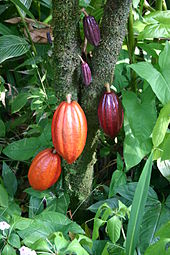Nigeria should see a bumper cocoa harvest in the
coming season as late rains have helped boost pod production, the head
of the cocoa association said on Thursday.
coming season as late rains have helped boost pod production, the head
of the cocoa association said on Thursday.

Sayina
Riman, president of the Cocoa Association of Nigeria (CAN), expects
output for the new season which starts in October to hit between 300,000
tonnes and 320,000 tonnes, up sharply from the season just ended which
was blighted by poor weather.
Riman, president of the Cocoa Association of Nigeria (CAN), expects
output for the new season which starts in October to hit between 300,000
tonnes and 320,000 tonnes, up sharply from the season just ended which
was blighted by poor weather.
The cocoa season
in Nigeria, the world’s fourth biggest producer, runs from October to
September, with an October-to-February main crop and a smaller light or
mid-crop that begins in April or May and runs through September.
in Nigeria, the world’s fourth biggest producer, runs from October to
September, with an October-to-February main crop and a smaller light or
mid-crop that begins in April or May and runs through September.
The
2016/17 season started at a slow pace after drought cut the mid-crop
harvest by 40 percent. Output for that season was estimated to reach
260,000 tonnes, Riman said, lower than a revised forecast of 280,000
tonnes and down from 340,000 tonnes forecast at the start of the season.
2016/17 season started at a slow pace after drought cut the mid-crop
harvest by 40 percent. Output for that season was estimated to reach
260,000 tonnes, Riman said, lower than a revised forecast of 280,000
tonnes and down from 340,000 tonnes forecast at the start of the season.
“We have late rains which has affected
production. We are hoping that from the first week of October, we should
be talking of increased yield,” Riman told Reuters.
production. We are hoping that from the first week of October, we should
be talking of increased yield,” Riman told Reuters.
The
International Cocoa Organization (ICCO), however, gives much lower
estimates of Nigerian cocoa output. It forecast last season’s production
at 220,000 tonnes.
International Cocoa Organization (ICCO), however, gives much lower
estimates of Nigerian cocoa output. It forecast last season’s production
at 220,000 tonnes.
Riman did not give a reason
for the discrepancy. Nigerian government production figures are also
significantly higher than ICCO estimates.
for the discrepancy. Nigerian government production figures are also
significantly higher than ICCO estimates.
“We
are looking at new plantations … rehabilitation of old farms, the
level of youth coming into farming and the recovery rate of abandoned
farms,” he said by phone.
are looking at new plantations … rehabilitation of old farms, the
level of youth coming into farming and the recovery rate of abandoned
farms,” he said by phone.
Farmers across
Nigeria’s main growing regions were optimistic as some had used the
drought to prepare their farms, Riman said, but some have been stuck
with about two-thirds of their produce due to the glut in the world
market.
Nigeria’s main growing regions were optimistic as some had used the
drought to prepare their farms, Riman said, but some have been stuck
with about two-thirds of their produce due to the glut in the world
market.
World cocoa prices have declined by a
third in the last year amid a global supply glut after record production
from top growers Ivory Coast and Ghana. ICCO predicts a global surplus
of 371,000 tonnes for 2016/17.
third in the last year amid a global supply glut after record production
from top growers Ivory Coast and Ghana. ICCO predicts a global surplus
of 371,000 tonnes for 2016/17.
Demand for the
London September contract has been dampened by the prospect of receiving
cocoa from Nigeria and Cameroon where buyers have less control over the
quality of beans.
London September contract has been dampened by the prospect of receiving
cocoa from Nigeria and Cameroon where buyers have less control over the
quality of beans.
Cocoa trees need a delicate
balance of rainy and dry weather. Too little rain and they wither; too
much and they become susceptible to insects or fungal black pod disease.
Beans can also go mouldy if small farmers are unable to dry them
outside.
balance of rainy and dry weather. Too little rain and they wither; too
much and they become susceptible to insects or fungal black pod disease.
Beans can also go mouldy if small farmers are unable to dry them
outside.
One farmer in the southeast region
said prices dropped from a high of 1.2 million naira ($3,922) earlier
this year to 400,000 naira within a six-month period.
said prices dropped from a high of 1.2 million naira ($3,922) earlier
this year to 400,000 naira within a six-month period.
Riman says
the West African country needed to develop its local markets. “All of us
in producing countries have realised that you need local consumption to
make cocoa farming sustainable.”
the West African country needed to develop its local markets. “All of us
in producing countries have realised that you need local consumption to
make cocoa farming sustainable.”
Source: Reuters











